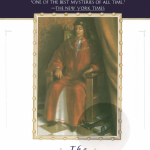 Ngaio Marsh’s first novel, A Man Lay Dead, is a competent, entertaining mystery, and already quite distinct in tone from the work of Marsh’s contemporaries; yet, as I noted last week, it’s still lacking that which makes Marsh’s novels so special. By Vintage Murder
Ngaio Marsh’s first novel, A Man Lay Dead, is a competent, entertaining mystery, and already quite distinct in tone from the work of Marsh’s contemporaries; yet, as I noted last week, it’s still lacking that which makes Marsh’s novels so special. By Vintage Murder, the fifth “Roderick Alleyn” novel*, Marsh has quite hit her stride and her skill is in full force.
I chose this one because it is the first in which Inspector Alleyn is shorn of his regular support, and in particular of his “Watson”, journalist Nigel Bathgate. One of the shortcomings of A Man Lay Dead is that it’s all from Bathgate’s point of view; one of the great strengths of Vintage Murder is that it’s from Alleyn’s point of view.
Vintage Murder takes Alleyn on holiday to New Zealand (Marsh’s home); and on the last leg of the journey he’s thrown together with an English acting troupe, heading to New Zealand on tour. He has a bit of an in with them; a delightful old trouper named Susan Max appeared in Marsh’s second outing, Enter a Murderer. The troupe is led by a couple, leading lady Carolyn Dacres and her manager husband Alfred Meyer. Alleyn comes to their opening show, and then to the cast party afterwards, which is in celebration of Dacres’ birthday. And of course there’s a murder and although Alleyn is traveling for his health he’s drawn in and works with the New Zealand police to solve it.
There are two things that elevate this book over Marsh’s initial outing. The first, as I say, is that it’s from Roderick Alleyn’s point of view. And the thing about Alleyn that’s delightful is that he’s a skilled observer, not merely of rooms and arrangements and clues, but of people, of their characters and reactions. He reads them well, and while investigating adjusts he chameleon-like adjusts his manner and speech and behavior accordingly.
“My movements?” [Liversedge] raised his eyebrows and took out his cigarette-case. All his actions were a little larger than life. Alleyn found himself thinking of them in terms of stage-craft. “Bus.— L. taps cigarette. Takes lighter from pocket. Lights cigarette with deliberation.”
The second is simply Marsh’s skill with prose and dialog and dialect; I had forgotten how marvelous it is. Here are some examples. First, a character drawn in detail with a single line:
The cub, as Hambledon had called Gordon Palmer, was seventeen years old, dreadfully sophisticated, and entirely ignorant of everything outside the sphere of his sophistication.
Next, it doesn’t hurt that Marsh was no stranger to the secrets of the theater:
One by one the members of the company came out from their dressing-rooms. Most actors have an entirely separate manner for occasions when they mix with outsiders. This separate manner is not so much an affectation as a persona, a mask used for this particular appearance. They wish to show how like other people they are. It is an innocent form of snobbishness. You have only to see them when the last guest has gone to realise how complete a disguise the persona may be.
The company’s leading man is carrying a torch for Carolyn Dacres, who likes him but isn’t having any:
“I know we have but I’m at the end of my tether. I can’t go on seeing you every day, working with you, being treated as though I was—what? A cross between a tame cat and a schoolboy. I’m forty-nine, Carol, and I—I’m starved. Why won’t you do this for both of us?”
“Because I’m a Catholic.”
“You’re not a good Catholic. I sometimes think you don’t care tuppence about your religion. How long is it since you’ve been to church or confession or whatever it is? Ages. Then why stick at this?”
“It’s my church sticking to me. Bits of it always stick. I’d feel I was wallowing in sin, darling, truthfully I would.”
In short, even if you don’t care much about the puzzle aspect of mysteries (an aspect that Marsh is always attentive to) there’s a great deal here for the Constant Reader to enjoy.
____
* I do not intend to review all of the Alleyn mysteries; mystery novels (especially the classics) tend to be kind of like popcorn: short and quickly read. If I reviewed them at a rate of one a week after reading them at a rate of several a week I’d write about nothing else for the better part of a year and by the time I got to the last one I wouldn’t remember enough about it to be sensible. In short, don’t presume that because I’m skipping that the books in between aren’t worth reading—they are.
photo credit: public domain
















